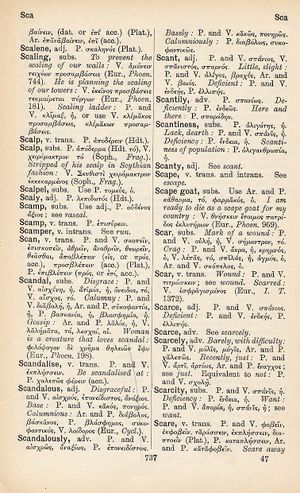scandalous: Difference between revisions
From LSJ
τούτων γάρ ἑκάτερον κοινῷ ὀνόματι προσαγορεύεται ζῷον, καί ὁ λόγος δέ τῆς οὐσίας ὁ αὐτός → and these are univocally so named, inasmuch as not only the name, but also the definition, is the same in both cases (Aristotle, Categoriae 1a8-10)
(Woodhouse 4) |
(CSV5) |
||
| Line 1: | Line 1: | ||
{{ | {{Woodhouse1 | ||
| | |Text=[[File:woodhouse_737.jpg|thumb|link={{filepath:woodhouse_737.jpg}}]]'''adj.''' | ||
<b class="b2">Disgraceful</b>: P. and V. [[αἰσχρός]], [[ἐπονείδιστος]], [[ἀνάξιος]]. | |||
<b class="b2">Base</b>: P. and V. [[κακός]], [[πονηρός]]. | |||
<b class="b2">Calumnious</b>: Ar. and P. [[διάβολος]], [[βάσκανος]], P. [[βλάσφημος]], [[συκοφαντικός]], V. [[λοίδορος]] (Eur., ''Cycl.''). <b class="b2">Scandalously</b>, adv.: P. and V. αἰσχρῶς, ἀναξίως, P. ἐπονειδίστως. | |||
<b class="b2">Basely</b>: P. and V. κακῶς, πονηρῶς. | |||
<b class="b2">Calumniously</b>: P. διαβόλως, συκοφαντικῶς. | |||
}} | }} | ||
Revision as of 10:00, 21 July 2017
English > Greek (Woodhouse)
adj.
Disgraceful: P. and V. αἰσχρός, ἐπονείδιστος, ἀνάξιος.
Base: P. and V. κακός, πονηρός.
Calumnious: Ar. and P. διάβολος, βάσκανος, P. βλάσφημος, συκοφαντικός, V. λοίδορος (Eur., Cycl.). Scandalously, adv.: P. and V. αἰσχρῶς, ἀναξίως, P. ἐπονειδίστως.
Basely: P. and V. κακῶς, πονηρῶς.
Calumniously: P. διαβόλως, συκοφαντικῶς.

